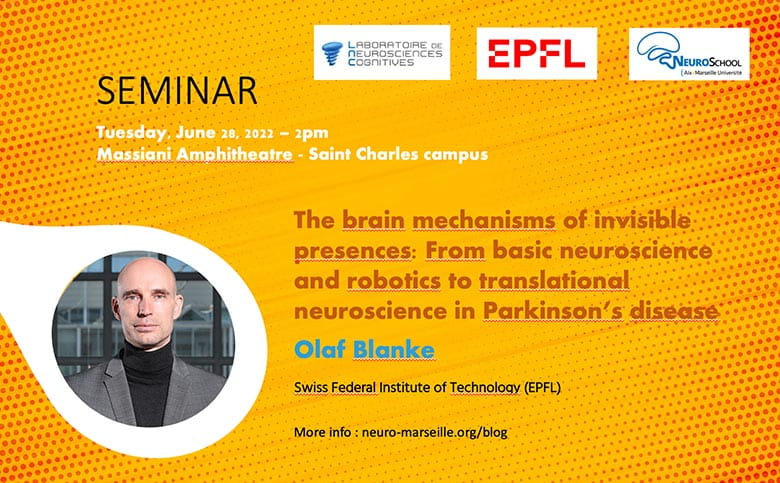Description de la soumission d'un avis

Tutored seminar: Olaf Blanke
The brain mechanisms of invisible presences: From basic neuroscience and robotics to translational neuroscience in Parkinson’s disease
Seminars of the doctoral program are open to everyone, and special times upstream and downstrem are dedicated to PhD students.
On June 28, 2022, the NeuroSchool doctoral program will invite Olaf Blanke (Swiss Federal Institute of Technology – EPFL), for a seminar entitled “The brain mechanisms of invisible presences: From basic neuroscience and robotics to translational neuroscience in Parkinson’s disease“.
Abstract
Although hallucinations are important and frequent symptoms in major psychiatric and neurological diseases, little is known about their brain mechanisms. Hallucinations are unpredictable and private experiences, making their investigation, quantification, and assessment highly challenging. A major shortcoming in hallucination research is the absence of methods able to experimentally induce specific hallucinations in real-time, which resemble clinical hallucinations. By integrating clinical observations and recent advances in cognitive neuroscience with robotics, we have designed a novel device and sensorimotor method able to repeatedly induce a specific, clinically relevant hallucination: presence hallucination (PH). Highlighting single subjective reports as well as group studies, I will present observations in healthy participants and in neurological patients that allowed us to define the perceptual and neural mechanisms of the sense of presence, including MRI-compatible robotics and brain imaging. These findings show that PH are based on specific sensorimotor processes, reflecting a misperception of the source and identity of sensorimotor signals of one’s own body and is closely associated with brain mechanisms of agency and self-other discrimination. Next I will present recent data about robot-induced PH in patients with Parkinson’s disease (PD). Although PD is primarily defined as a movement disorder it manifests in a large wide variety of non-motor symptoms that include cognitive decline and psychiatric symptoms, such as hallucinations. Hallucinations occur in up to 60% of PD patients, are one of the most debilitating non-motor symptoms, and predict a more severe and more rapidly advancing form of PD. Applying the device and method of robot-induced presence hallucinations to PD, allowed us to determine that PD patients have enhanced sensitivity for conflicting sensorimotor stimulation and robot-induced PH. By combining MR-compatible robotics, FMRI, and sensorimotor stimulation, we further showed that robot-sensitive PD patients suffer from a selective disruption of a fronto-temporal network. These robotics-neuroimaging findings extend existing sensorimotor hallucination models to PD and reveal the pathological cortical sensorimotor processes of PH in PD, indicating a more severe form of PD associated with psychosis and cognitive decline. I conclude by highlighting the relevance of hallucination engineering for basic and neuroscience and translational neurodegeneration research.
Tuesday June 28, 2022, Massiani Amphitheatre - Campus Saint-Charles
Please, note that the seminar will take place during the NeuroMarseille’s day (day of conferences, workshops and convivial activities), to which the whole neuroscience community is invited. If you are looking for more details on the NeuroMarseille’s day, follow this link.
Program:
- Monday, June 27 – 2pm – Discussion among students to examine the papers – For Ph.D students only – Place to be approved
- Tuesday, June 28 – 2pm – Seminar – Open to all – Massiani Amphitheatre (Chemistry building n°7) – Campus Saint-Charles
- Tuesday, June 28 – 3pm – Special discussion time with the speaker – For Ph.D students only – Massiani Amphitheatre (Chemistry building n°7) – Campus Saint-Charles
📢 Ph.D. Students, register on AMETICE for your hours to be counted. Attendants get 3 hours, chairpersons 4 hours.
Register to the seminar
Our speaker

Olaf Blanke is Bertarelli Foundation Chair of Cognitive Neuroprosthetics at the Swiss Federal Institute of Technology (EPFL), where he directs the Laboratory of Cognitive Neuroscience at Geneva's Campus Biotech. He founded and directed EPFL’s Center for Neuroprosthetics and is Adjunct Professor at Geneva University Hospital. Blanke’s research focuses on the neuroscience of consciousness and embodiment, human augmentation and personalized medicine. Blanke pioneered robotics and virtual reality technology in neuroscience of consciousness studies and cognitive psychology. His medical- translational activities are dedicated to preventive, diagnostic and therapeutic procedures and devices in neurodegenerative disorders (Parkinson’s disease, Dementia), mental health and well-being. Blanke is co-founder of Metaphysiks Engineering and member of the board of Mindmaze.

